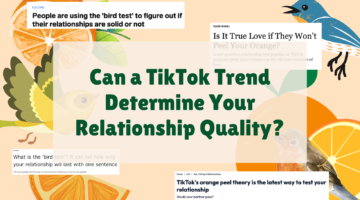Your Unconscious Feelings Predict Relationship Success Better Than You Can
December 11, 2013 by Justin Lehmiller

It is an unfortunate reality, but not all marriages last. In fact, research in the United States finds that newlywed couples have only a 50-50 chance of their marriage lasting 20 years. This has led many scientists to wonder whether there is any way to predict whether a given marriage will stand the test of time. A new study suggests that one important factor in predicting long-term marital bliss may be the unconscious feelings people have about their partners.
In this research, a group of 135 newly married heterosexual couples in the state of Tennessee were recruited [1]. Both partners were surveyed once between 2006-2007. After that, the researchers checked in with the couples every six months for the next four years to see how things were going. During the initial survey, the partners’ conscious and unconscious attitudes toward each other were measured. To assess conscious attitudes, participants were simply asked to rate whether their marriage was good or bad and whether they were satisfied or dissatisfied.
To measure unconscious attitudes, participants completed a computerized task in which an image of a person would flash on the screen for 1/3 of a second. Following this, a word would appear on the screen (e.g., “love”) and participants would have to press a button as quickly as possible to categorize that word as good or bad. On some trials, participants were sometimes shown pictures of their partners, while other times they were shown pictures of strangers prior to categorizing words. What the researchers were most interested in was how quickly people categorized positive and negative words after seeing a picture of their partner. When people categorize positive words faster than they categorize negative words after seeing their partner, it tells us that they automatically associate their partner with good things; when people categorize negative words faster than positive words, it tells us that people automatically associate their partner with bad things.
You might be wondering whether the measures of conscious and unconscious relationship attitudes were correlated with one another, and they were not. In other words, just because you know how someone scored on one measure doesn’t tell you anything about how they scored on the other. In other words, the unconscious attitudes really did seem to be unconscious.
So how did conscious and unconscious attitudes relate to changes in marital satisfaction and reports of relationship problems over time? Conscious attitudes were unrelated to changes in satisfaction and relationship problems over the four years of the study. In other words, what people said they were feeling in the initial survey said nothing about their long-term happiness. However, unconscious attitudes were related to changes in satisfaction and relationship problems. Specifically, people who had positive unconscious attitudes initially had the highest levels of relationship quality at the end of the study. I should clarify that everyone’s relationship satisfaction decreased over time, but for people who had positive unconscious attitudes, their satisfaction decreased the least.
What are the implications of this research? For one thing, the findings suggest that if we can find ways to enhance the positive associations people have with their partners, we could potentially increase their relationship happiness in the long run. On the flip side, if we can help people to become more in-tune with these automatic associations, perhaps we can help them to make better relationship decisions. Of course, we’re getting ahead of ourselves here because this is just the first study demonstrating this finding, the sample was pretty limited, and the effects were relatively small. So, we’d certainly want to see a lot more research before seriously considering any kind of practical application; however, it is clear that there is at least the potential for some major implications.
For the time being, all we can really say is that people’s unconscious feelings may actually be better predictors of future relationship happiness than their conscious feelings.
Want to learn more about The Psychology of Human Sexuality? Click here for a complete list of articles or like the Facebook page to get articles delivered to your newsfeed.
[1] McNulty, J. K., Olson, M. A., Meltzer, A. L., & Shaffer, M. J. (2013). Though they may be unaware, newlyweds implicitly know whether their marriage will be satisfying. Science, 342, 1119-1120.
Image Source: iStockphoto.com
You Might Also Like:

Dr. Justin Lehmiller
Founder & Owner of Sex and PsychologyDr. Justin Lehmiller is a social psychologist and Research Fellow at The Kinsey Institute. He runs the Sex and Psychology blog and podcast and is author of the popular book Tell Me What You Want. Dr. Lehmiller is an award-winning educator, and a prolific researcher who has published more than 50 academic works.
Read full bio >

